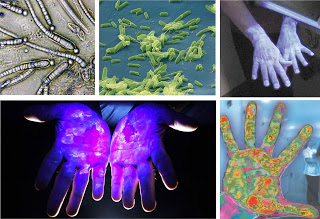
Christmas is a time that friends and family get together. The work parties, the running around delivering presents to the relatives, the last-minute shopping and Christmas day itself, it’s stressful! We are often so busy and the last thing we need is to come down with a cold, flu or stomach bug to disrupt our carefully crafted plans or family visits.
Unfortunately bugs can spread like wild-fire and it is much more likely that bacteria and viruses take a strong hold in these winter months, particularly in the very young and old. We tend to close all the windows and whack on the heating, creating a lovely cosy and stuffy environment that bugs will thrive in. Having the heating on dries out our mucosa (the cells that line the nose and throat) making it much easier for bugs to infect us.
So how can you minimise the risk of picking up the unpleasant and unwanted bug?
1. Try to make time to chill out, ensure you get a decent amount of fresh air, do some exercise and get enough sleep (a minimum of 6hrs). Burning the candle at both ends, doing less exercise and being stressed can all have a negative effect on our immune system. Prolonged periods of stress raise the level of a chemical in the body called cortisol. This stress hormone reduces the activity of the defensive cells that carry out the immune response against disease-causing bugs, making it more likely that we fall ill and take longer to recover.
2. Ensure you get some wholesome food in-between the party food! Drinking in excess and overindulging can mean we are not getting the right nutrients our body needs to support our immune system. Simply not eating enough fresh fruit, vegetables and whole grains mean we can become lacking in key vitamins (A, C, E) and minerals (Iron, Selenium and Zinc) that our immune system needs to do its job well.

Contamination that you can see!
3. If you have the sniffles or a cough, try to keep it to yourself! Being in close proximity and in contact with others makes it very likely you will spread your germs. As the saying goes; coughs and sneezes spread diseases and it is important to know that bacteria and viruses linger in our environment for longer than you might think. Bugs can easily survive on hard surfaces and our skin, typically between 20mins to 24hrs – Take at look at this NHS page: How long do bacteria and viruses live outside the body? for some interesting stats. When we sneeze, the microscopic droplets that we project into the air can remain suspended for hours, making all too easy for your unsuspecting friends and family to breathe them in. Nice.
4. So don’t share wine glasses, think twice before sharing cutlery if you are tasting each other’s food and always be wary of buffet food where there is a free for all, for everyone to dig in with their hands. You might want to know that Norovirus (the winter vomiting bug) is highly contagious and is THE most common cause of infectious intestinal disease, resulting in diarrhoea and vomiting in the UK.

5. Now Christmas wouldn’t be Christmas without mistletoe and as much as kissing can be very healthy, if the person you are kissing is like a petri dish then hold back a little! To put this into perspective, a quick light kiss may transfer a meagre 1,000 bacteria, whilst a more passionate one could transfer up to 80million! You can always go for an air kiss or blow a kiss to avoid a sloppy wet one! Or perhaps we should do as the Eskimos do and try a nose kiss?! Personal hygiene is also hugely important so ensure you wash your hands regularly and dispose of your tissues as soon as possible after you use them.
6. Finally, preparing and eating a turkey dinner can also be one of the most hazardous things you do over the Christmas period in terms of spreading of germs. We prepare more food for more guests than we usually do, we cook things we don’t often cook and then have to store mountains of leftovers, all of which have safety implications.

Campylobacter
- Keep your uncooked turkey well away from all other ready-to-eat foods in your fridge to prevent contamination.
- If you are having a frozen turkey you MUST ensure it is thoroughly defrosted before cooking. Allow at least 2 days, depending on size, and defrost it in your fridge. NEVER try to speed up thawing by putting your turkey in the bath or by a radiator as you will simply encourage bacterial growth. If your turkey is not fully thawed, it may not cook evenly so parts of the bird may not reach sufficient temperature to kill bugs like salmonella and campylobacter. These can cause a nasty bout of food poisoning.
- Never wash your turkey! Campylobacter is THE most common cause of food poisoning in the UK. Washing poultry before cooking it does not remove the bacteria (only cooking will kill them); it simply spreads the bacteria over your sink, kitchen surfaces and any onto items around your sink through splashing of water.
- If having stuffing with your turkey, it is advisable to cook it separately rather than in the cavity of the bird. Again, your turkey may cook unevenly if it is filled with stuffing and you may underestimate the time required to cook your turkey thoroughly.
- Many of us are eating the leftover turkey for days but we are actually advised to consume it within 48hrs!
NHS choices have a really useful page on preparing and cooking your turkey safely here.

So with a little bit of extra thought and care we can minimise the spread of germs and really enjoy this special holiday season.